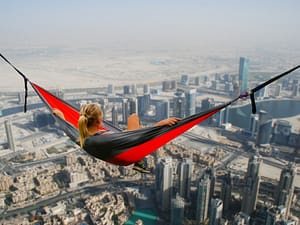There’s no doubt about it: Dubai is a shopper’s paradise. It may not be high culture, but it is high street. One could argue that all of the international fashions offered here are available in London, New York, or Milan, that Dubai actually isn’t any less expensive than elsewhere except for during a couple of festival periods, and that if you’re really looking for authentic Middle Eastern goods, Dubai is hardly at the center of production, and you’re better off elsewhere.
However, there’s something about shopping here that goes well beyond this being just a hot consumer market. I consider it more like a city of Shoppers Gone Wild, with an Arabian flair. Sure, this is the result of deft marketing, glitzy malls, duty-free prices, and wide consumer selection, but it’s also what you get when millions of people fly in from around the world each year to purchase items from every corner of the globe.
It sometimes seems the whole Dubai culture revolves around spending money. This is just as true for locals and expats as for visitors. Emiratis may be a minority in their own land, but you will see them en masse at the malls, since shopping is a favorite family pastime. Young Emiratis, who are less likely to hang out in the licensed bars of Western hotels, tend to congregate in the malls. In summer, the heavily air-conditioned shopping centers are among the only places anyone wants to go, since it’s as hot as an inferno outside. So, the whole population ends up shopping through the summer, particularly during Dubai Summer Surprises, with only a marginal decrease come fall. And then there’s Dubai Shopping Festival (DSF), the apex of the year-round shopping frenzy that grows larger year by year, as people pour into Dubai from all directions to fill their bags, get some sun, and return home with more photos but diminished savings.
The diversity of goods at the many fanciful malls, markets, and stores is truly impressive, the result of Dubai’s heritage as an expanding center of trade. There are traditional souks selling everything from textiles and carpets to antiques, handicrafts, electronics, food, and spices. There’s Dubai’s world-famous Gold Souk, where skillful bargaining can lend you an excellent deal. There are mega-malls and shopping centers that resemble amusement parks, world-class department stores selling the latest international fashions, and independent stores and eclectic boutiques offering goods to suit particular tastes. You’ll easily find recognizable American, European, and Asian products, but make sure not to overlook what Dubai more uniquely offers: jewelry of Middle Eastern design, local fashion, Arabian perfumes, carpets and tapestries, antiques, shisha pipes, and other regional goods.
Despite the hype, you may not find prices much lower than you would during sales periods in the U.S. and Europe, except during the shopping festivals, when prices really are temptingly low. The obvious savings come from the absence of a sales tax. The best day-to-day bargains are found in the bazaars – if you’re a skillful negotiator. Bargaining is common in the souks, but not in the malls or established stores. Don’t expect to get a refund when you buy from anywhere other than an established international store, and even in those check the policy carefully, as refunds are often heavily restricted. Most stores in Dubai are open until 10pm (many malls stay open until midnight on Thursday and Friday), and accept all major credit cards; cash is the usual method of payment in the souks. Self-parking at malls is usually free, while valet parking is offered for a fee.
Dubai’s traditional shopping areas include Al Riqqa Road, Al Dhiyafa Road, Bani Yas Square, and Karama, which sells mostly pirated and counterfeit goods. Higher-end fashions are available along Jumeirah Beach Road, at the many large shopping centers, and in the duty-free complex at the airport.
Now open next to the world’s tallest building, the Dubai Mall at Burj Khalifa has overtaken Mall of the Emirates and become the city’s biggest mall and the largest shopping center outside North America. It offers over a thousand retail outlets, 160 eateries, indoor ice-skating rink, giant aquarium, high-tech cinema and theme park, kids’ entertainment center, luxury hotel, and amazing water fountain show. In New Dubai, The Walk at Jumeirah Beach Residence (JBR) is quickly becoming the trendiest place in town for outdoor shopping and people-watching.
High quality Persian and other regional carpets are signature items in Dubai, which you can buy more easily, if not more inexpensively, here than in most other major cities. Most of the big shopping centers have stores selling hand-made carpets, as do the more traditional souks. Be sure to do your homework, shop around, inspect the carpets, and bargain before making your final decision, as a nice carpet can be a major investment. The most expensive are generally silk rugs from Iran.

